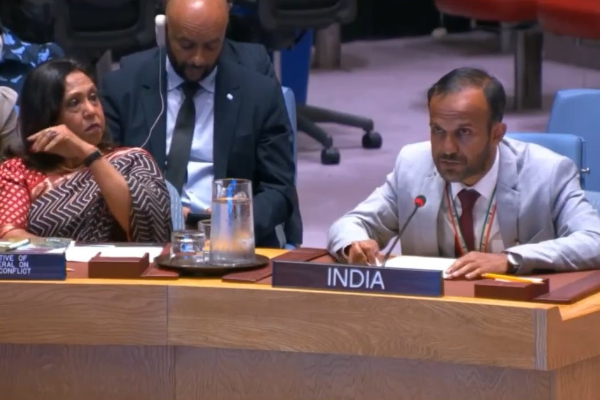India’s Charge d’Affaires at the United Nations, Eldos Mathew Punnoos, on Tuesday (local time) strongly denounced Pakistan’s long-standing record of sexual violence, tracing it back to the atrocities of 1971.
Speaking at the UN Security Council’s Open Debate on “Conflict-Related Sexual Violence,” Punnoos underlined that such crimes, particularly against women from minority groups in Pakistan, remain a grim reality even today.
‘Mass Sexual Violence’
“The Pakistan Army’s appalling record of committing mass sexual violence against hundreds of thousands of women in erstwhile East Pakistan during 1971 is well-documented and remains a permanent blot in history. Tragically, this deplorable trend continues without accountability to this very day,” he said.
With Pakistan currently holding a non-permanent seat on the UNSC, India reminded the council of the Army’s brutalities against Bangladeshi women during the Liberation War.
“Cases of abduction, trafficking, forced and child marriages, domestic servitude, sexual abuse, and coerced religious conversions continue to be deployed as tools of persecution against vulnerable women and girls belonging to ethnic and religious minorities. These crimes are not only reported widely but are also documented in recent OHCHR reports,” Punnoos noted.
He went on to say that Pakistan’s judiciary itself has often lent legitimacy to such practices, perpetuating impunity.
Call For Justice
“These reports reveal how the judiciary validates such vile acts. It is strikingly ironic that those guilty of committing and enabling these crimes now try to present themselves as defenders of justice. Their duplicity and hypocrisy speak for themselves,” he said.
Calling for accountability, Punnoos stressed that perpetrators of such heinous acts must face justice.
“Conflict-related sexual violence must be condemned unequivocally, and those responsible must be punished. Such crimes not only shatter the lives of individuals but also tear apart the social fabric, leaving communities scarred for generations,” he said.
Punnoos further emphasised the importance of victim support alongside punitive measures.
“Addressing this grave issue requires a multi-pronged strategy—prosecuting offenders, ensuring they do not escape justice, and centring the needs of survivors in both prevention and response efforts,” he said.
India Stresses Victim Support
He also referred to UNSC Resolution 2467 (2019), which underscores the necessity of providing victims with access to relief and reparations programmes, healthcare, psychosocial assistance, safe shelter, legal aid, and measures for rehabilitation and reintegration.
Highlighting India’s proactive role, Punnoos recalled that India was among the earliest contributors to the Secretary General’s Trust Fund in support of victims of sexual exploitation and abuse.
“This fund remains a vital instrument that must be strengthened further. India was one of the first to contribute to it and continues to extend its support,” he said.
He added that in November 2017, India entered into a voluntary compact with the UN Secretary-General, pledging to eliminate sexual exploitation and abuse in peacekeeping, humanitarian, and development work.
Punnoos also noted that under Prime Minister Narendra Modi, India joined the circle of leadership for the prevention of sexual exploitation and abuse within UN operations, underscoring the seriousness with which the country treats the issue.
Women Peacekeepers Driving Impact
“Our women engagement teams deployed in conflict zones as part of peacekeeping missions have proven highly effective in connecting with local communities, supporting victims, addressing gender-sensitive concerns, and enhancing the overall success of such operations,” he said.
Citing India’s pioneering contributions, he pointed out that in 2007, India became the first country to deploy an all-women police contingent to the UN Mission in Liberia.
Today, female contingents serve in MONUSCO, UNICEF, and UNMAS, specifically with the goal of countering sexual and gender-based violence in conflict situations.
Building on this, the Centre for United Nations Peacekeeping in Delhi runs specialised training to prepare more women peacekeepers and provide targeted instruction on preventing gender-based violence.
“India stands ready to share its experience and expertise with member states interested in adopting similar measures. This was also discussed at the Global South Women Peacekeepers Conference held in New Delhi in February 2025,” he said.
Punnoos highlighted that India’s domestic initiatives could also serve as a model for others.
He pointed to the Nirbhaya Fund—created with around USD 1.2 billion—as a non-lapsable resource dedicated to women’s safety, swift justice delivery, and crisis support infrastructure.
Emergency Response Mechanism
In addition, India operates a nationwide emergency response mechanism through helpline number 112 for women’s safety and has established Sakhi One Stop Centres in every district, providing integrated support such as police help, medical treatment, legal aid, shelter, and economic assistance.
“India has also instituted specialised training programs to expedite investigation and prosecution processes, including forensic training for medical officers to ensure evidence collection stands up in court,” Punnoos said, encouraging other countries to consider replicating such initiatives.
Concluding his remarks, Punnoos reaffirmed India’s firm commitment to eradicating sexual violence in armed conflicts and extending support to survivors.
“Let me once again reiterate India’s unwavering resolve to eliminate sexual violence in conflict and stand by survivors of such atrocious crimes,” he said.
(With inputs from IBNS)





